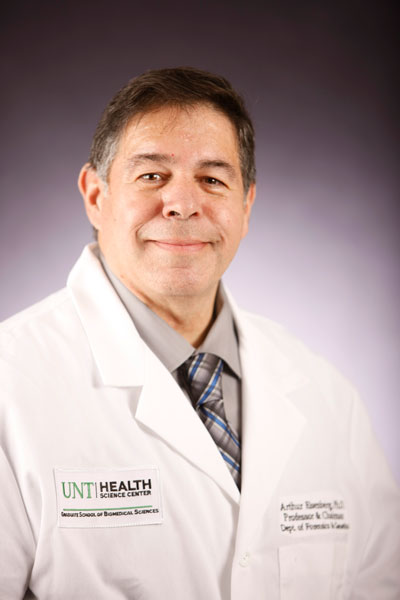Forensic DNA pioneer Arthur Eisenberg passes away at 62
By: Jeff Carlton
 Arthur Eisenberg, PhD, a pioneer in the field of forensic genetics who helped thousands of families identify their missing loved ones, died Thursday. He was 62.
Arthur Eisenberg, PhD, a pioneer in the field of forensic genetics who helped thousands of families identify their missing loved ones, died Thursday. He was 62.
Dr. Eisenberg, known as Art to his friends and colleagues, helped establish the UNT Center for Human Identification as well as UNT Health Science Center’s graduate program for forensic genetics.
His coworkers and friends at UNTHSC, where Dr. Eisenberg worked from 1989 until his retirement in 2017, described him as a brilliant scientist and compassionate man. He was “a forefather in bringing DNA typing into both paternity testing and the field of forensic genetics,” said Bruce Budowle, PhD.
“It wasn’t the science that was driving Art. It was the knowledge that he was making a difference by working with victims and their families, and with helping law enforcement agencies solve cases,” said Dr. Budowle, Co-Director of the Center for Human identification. “Art would go out of his way to help anybody. That was just his nature.”
Through the master’s program, he mentored a generation of forensic analysts who went on to solve cases and make DNA associations for state and federal law enforcement agencies across the United States. And under his leadership, the Center for Human identification became one of the nation’s top DNA laboratories. The lab has helped thousands of law enforcement agencies across the United States on tens of thousands of cases involving missing people or unidentified human remains.
In a career that spanned more than three decades, Dr. Eisenberg worked on cases involving serial killers, mass graves, hurricanes, terrorist attacks and all manner of violent crimes. He participated in large-scale efforts to identify victims of the Sept. 11 terrorist attacks, Hurricane Katrina, the 1973 Pinochet military coup in Chile and previously unidentified children found buried at a now-shuttered reform school for boys in Florida.
Though his mission was in using DNA to provide names to unidentified remains, his focus never wavered from families who were missing their loved ones.
“He was always all about the families,” said Linda LaRose, quality manager of the Center for Human Identification. “With every case that came through here, he never let us forget that there was a family out there who was missing a loved one. Because of him, we always knew how much our work meant and what our goals were.”
Dr. Eisenberg was a former chair of the United States DNA Advisory Board, served on the Texas Forensic Science Commission and was a member of the Department of Justice’s Missing Persons Task Force, the National Forensic DNA Review Panel, the Association of Forensic DNA Analysts and Administrators, the American Academy of Forensic Science and the American Association of Blood Banks. He was the 2011 recipient of the Paul L. Kirk Award from the American Academy of Forensic Sciences
Away from his lab, he enjoyed golfing, fishing and sharing quotes and re-enacting scenes from “The Three Stooges.” He also was a devoted husband, father and grandfather.
“Art was a kind, gentle man — and a wonderful colleague and mentor to many at UNTHSC,” said Dr. Michael R. Williams, President of UNTHSC. “Our forensic genetics program rose to world-class prominence under his leadership. He was a visionary scientist who embodied our purpose of transforming and improving lives.”
Dr. Eisenberg is survived by his wife, Debbie, of Weatherford, three daughters and four grandchildren. He was preceded in death by his beloved grandson Joeb Isaak Miller, age 8.
Services will be Nov. 15 at 10 am at Lucas Funeral Home, 1601 S. Main St., Keller. Visitation will be at 9 a.m.


![Uyen Sa Nguyen Scaled[58]](https://www.unthsc.edu/newsroom/wp-content/uploads/sites/16/Uyen-Sa-Nguyen-scaled58-145x175.jpg)


Social media